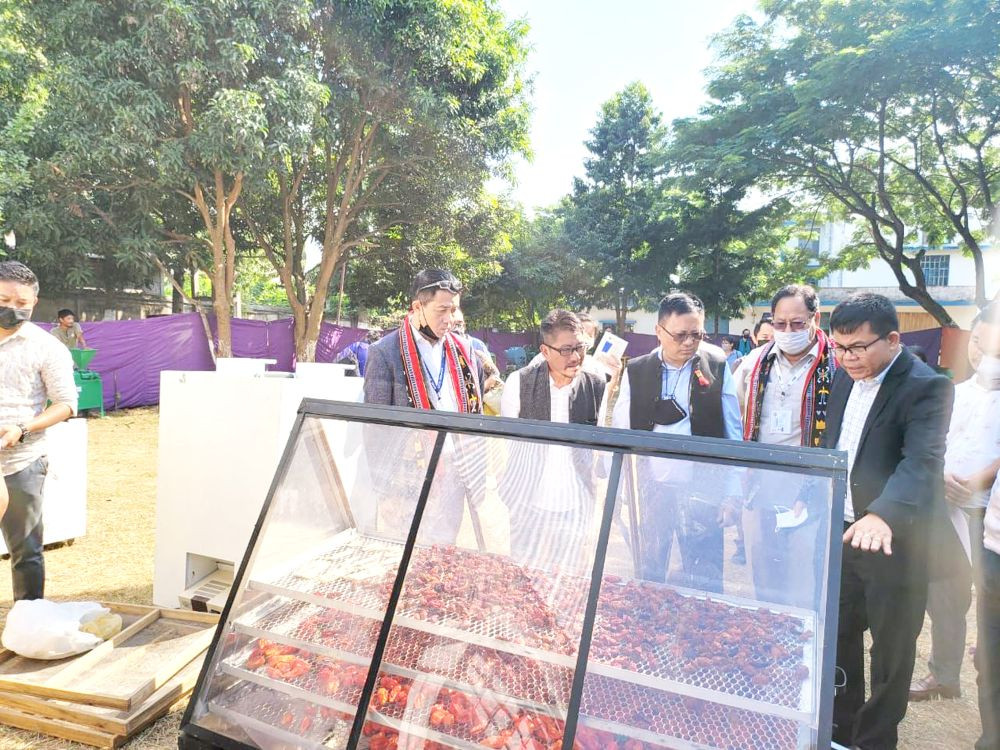Nagaland APC, Y Kikheto Sema along with other officials inspect a solar powered dryer built by the NTTC Dimapur on November 15.

Nagaland has the resources but not well organised
Morung Express News
Dimapur | November 15
On paper, three-fourth of the population in Nagaland is engaged in agriculture. However, this has still to translate into a robust agro-based economy.
With the horticulture sector gaining traction in the state, it is believed that food processing would be the key to adding business value to the various fruit crops grown in the state, thereby incentivizing the agricultural sector.
.jpg)
With this objective in mind, a 5-day ‘Skill Development Training Programme on Value Addition on Fruits, Vegetables & Spices Processing’ started at the Nagaland Tool Room & Training Centre (NTTC), Dimapur on November 15. Y Kikheto Sema, Agriculture Production Commissioner (APC), Nagaland, addressed the inaugural session.
The training was organised by the Agricultural and Processed Food Products Export Development Authority (APEDA), in partnership with the Central Food Technological Research Institute-Council of Scientific & Industrial Research (CSIR-CFTRI) with the NTTC as the training venue.
.jpg)
As informed at the inaugural programme today, some 30 aspiring entrepreneurs signed up for the training under the guidance of Scientists from the CSIR-CFTRI, Mysuru.
One of the resource persons for the training, Dr Ng Iboyaima Singh, Chief Scientist, CSIR-CFTRI, Mysuru, told The Morung Express that the target is to acquaint the entrepreneurs on the workings of the food processing industry— the technology available and avenues provided by the Union government to get a foothold in the trade.
According to him, Nagaland has the raw materials (food crops) to sustain food processing industry. The problem however, he said, “It is not well organised,” with production scattered coupled by little or no processing units.
.jpg)
Having centralized collection units, where the crops would be pooled and processed, would greatly aid in overcoming the problem, he said, while adding that it would also require a coordinated effort of the agriculture and allied Departments alongwith the banks. This is where entrepreneurs would come in.
For instance, he said, “We can have a common processing facility for pineapple,” where the crop would be collected, processed and marketed. “We call it value addition. Whatever pineapple you have, it would be processed and added value for marketing.”
“When you think of equipments, the NTTC have developed a lot of equipment related to agro processing. We can tie up with them... In this manner, the food processing industry will develop,” he added.
Echoing a similar view, Nagaland APC, Y Kikheto Sema, in his address, asserted that post-harvest management is very important. According to him, there is no shortage of supply and processing should start in the state itself.
With the state in relative peace and connectivity improving, he said that the government is today focused on economic development as opposed to the days when much of the government machinery was concentrated on law and order.
.jpg)
He said that the majority of the state population may be engaged in agriculture; however, more than 70 percent are primarily jhum cultivation. He cited an example of a rural couple toiling on a piece of land the entire year and their income from the year-long work, after accounting for expenses, totaling roughly Rs 15,000 or Rs 30 per day. Jhum, he added, is not economically viable.





